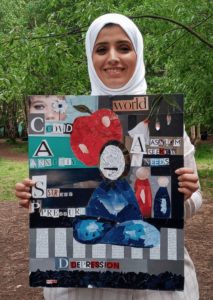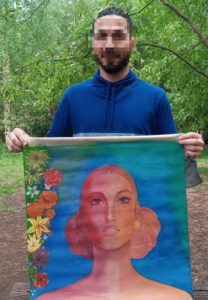The Museum of Things is a creative space led by refugee artists. The group – which is made up of asylum seekers, refugees and migrants who have settled in Glasgow – have been meeting online since the start of the year.
In their weekly workshops, group members can connect, experiment with different artistic techniques, discover new talents, share their skills and celebrate self-expression. We caught up with artists, Mousa and Paria, and groups members Maha and Ehsan to find out more…
Mousa: It was a big challenge for us to start this group when we did, while we were in lockdown. Each week, we meet on Zoom for two hours and we focus on a different topic or technique. We planned the 20 sessions of the workshop in advance so we knew what materials would be needed. We tried to make it accessible, easy and engaging.
Paria: We wanted to challenge the narrative around refugees and asylum seekers so that it’s not just associated with drama, sadness and negative feelings. Instead, we wanted to overcome this and turn it into something fun and meaningful. Before anything else, we wanted to show that refugees are human beings with needs and feelings.
Mousa: There are about 20 people in the group, all from a refugee background. Some are still in the asylum process, so they have appointments with lawyers and aren’t able to make it to every session. With the pandemic, we’ve had participants living in hotels and moving from place to place. Rose and Pinar from Maryhill Integration Network have really helped to keep the group together and provide support. They deliver the art materials to people and make sure they have internet.
Paria: It’s really nice to see people turning up each week and participating. It’s really inspiring. They are all so passionate and so creative. The feedback has been great. They tell us that the project has helped with their mental health. They’re happy and looking forward to the next week. It keeps people busy and gives them something to focus on.
Mousa: We wanted to create a safe space for people to meet each other, learn new things and use their creativity. The aim is to give people skills and confidence that they can continue to build on and take further. When the workshops are over, there will be an exhibition featuring artwork produced by the participants.
Paria: With the pandemic, we don’t have space to come together as a community. That physical contact is so important, especially for people who are already feeling really isolated. This project has allowed people to make those human connections. We’ve built a small community where we can make friends and people can express themselves.
As a single mum finding her feet in a new country while caring for two young children, Maha struggled with the added pressures of lockdown. The weekly workshops have helped her to make new friends and manage her anxiety.
Maha told us: The art group has been so nice from the very beginning. They send us the materials and contact us before each session. It’s very well organised and very supportive.
 Mousa and Paria are very patient. They do a really good job. We feel that they care about us. We want to keep coming back every week. I’m in seven different groups, but this is the most useful one for me. I wanted to do something positive. It’s two hours a week that we have for ourselves.
Mousa and Paria are very patient. They do a really good job. We feel that they care about us. We want to keep coming back every week. I’m in seven different groups, but this is the most useful one for me. I wanted to do something positive. It’s two hours a week that we have for ourselves.
Through this group, I meet a lot of different people – different ages and cultures. We’re all working together. I have made a lot of really good connections. There are five people in our building who are all in the group and sometimes we meet up and finish our work together. I’ve met those people because of this group. When we finish each work, we share with each other. I want to see what other people are working on each week and what they’ve done. When I see their work, I feel very happy.
It’s not just about painting. We learn new techniques and find out about art. Every session we do something different. I’ve started drawing portraits for the first time. I created a collage to visualise the anxiety I was feeling in lockdown.
As a single mum, it was hard for me, but I was able to express what I was feeling through this collage. It took me three months to complete. I wanted to show the struggle of women in my culture. We have to fight from the very beginning – fight our culture and our circumstances. When I arrived here in Scotland I had to keep on fighting.
Akhtar* moved to Scotland during lockdown. He feels isolated and alone, but the group has given him a sense of purpose and helped him to build connections.

He explained: I’ve learned a lot and made good friends. It’s also really helped me to improve my English. I have issues with mental health and this workshop has really helped with that. If it wasn’t for this project, I would just be stuck at home with nothing but my thoughts. I would just eat, sleep and think.
Now I have something to look forward to. It really makes my day. Every week I know I’ll be doing something different. Some of the materials and techniques, I’m using for the first time. I had never worked with clay before. Discovering that I had this talent and being able to shape these materials and make something with them, it’s a very positive energy.
After each workshop, that feeling of positive energy stays with me for days. It’s a moment in the week when we’re not thinking about problems or the negatives that surround us. It helps to distract us and gives us an escape. I’ve developed strong friendships. If I didn’t have this workshop, I wouldn’t have made those connections.
When I collected together some examples of my work to bring here today, it made me so happy. Knowing that our work will be displayed in an exhibition is a very good feeling. It’s a chance to share what I’ve created with everyone.
*His name has been changed to protect his identity
